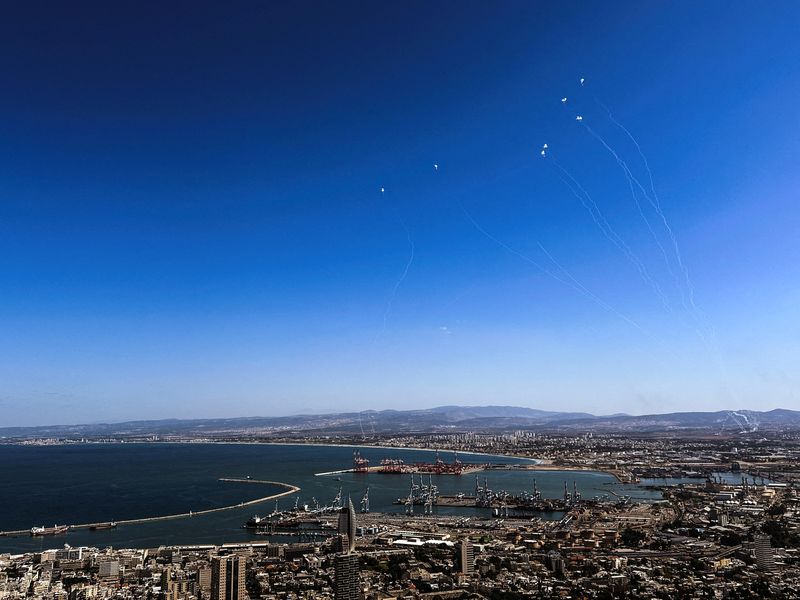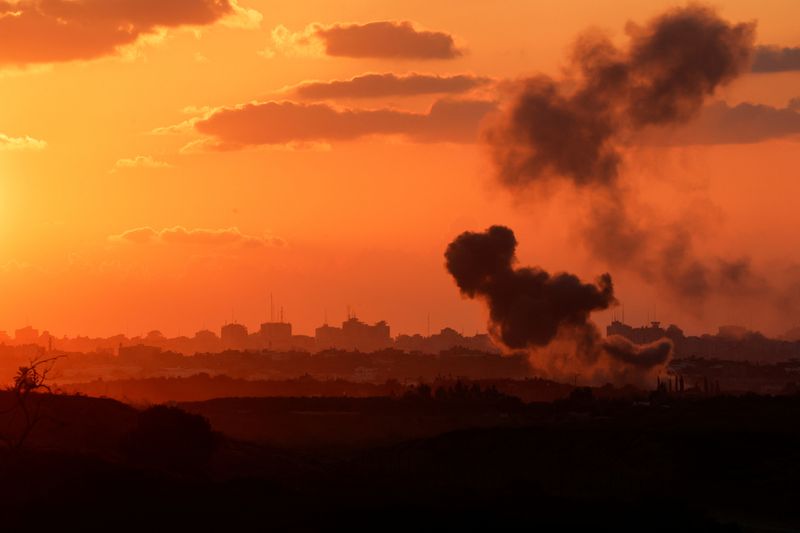By Samia Nakhoul, Tom Perry and James Mackenzie
DUBAI/JERUSALEM (Reuters) - The killing of Hamas leader Yahya Sinwar, a mastermind of the attack that ignited the war in the Gaza Strip, marked a major triumph for Israel. But Israeli leaders are also seeking to lock in strategic gains that go beyond military victories – to reshape the regional landscape in Israel's favour and shield its borders from any future attacks, sources familiar with their thinking say.
With U.S. elections approaching, Israel is rushing to inflict maximum damage on Hamas in Gaza and Hezbollah in Lebanon, and seizing the moment to carve out de facto buffer zones in a bid to create an irreversible reality before a new president takes office in January, eight sources told Reuters.
By intensifying its military operations against Hezbollah and Hamas, Israel wants to ensure that its enemies and their chief patron, Iran, don’t regroup and threaten Israeli citizens again, according to Western diplomats, Lebanese and Israeli officials, and other regional sources.
U.S. President Joe Biden is expected to use Sinwar’s killing to pressure Israeli Prime Minister Benjamin Netanyahu to wind down the war in Gaza. But the Israeli leader may prefer to wait out the end of Biden’s term and take his chances with the next president, whether the Democratic candidate, Vice President Kamala Harris, or Republican rival Donald Trump, with whom Netanyahu has had close ties.
Before considering any ceasefire agreements, Israel is accelerating its military campaign to push Hezbollah away from its northern border while thrusting into Gaza’s densely packed Jabalia refugee camp in what Palestinians and U.N. agencies fear could be an attempt to seal off northern Gaza from the rest of the enclave.
It is also planning a response to a ballistic-missile barrage carried out by Iran on Oct. 1, its second direct attack on Israel in six months.
"There is a new landscape, a new geopolitical change in the region," said David Schenker, a former U.S. assistant secretary of state for Near Eastern affairs who is now a senior fellow at the Washington Institute think tank.
Before Hamas' attack on Oct. 7, 2023, Israel was "willing to tolerate a high-level threat", responding to rocket fire from the Palestinian militant group and other foes with limited strikes, Schenker said. "No longer."
"This time Israel is fighting on many fronts. It's Hamas; it's Hezbollah, and Iran is coming soon," he said.
Hamas-led fighters killed around 1,200 people and seized more than 250 hostages during the assault in southern Israel, according to Israeli tallies. Israel's subsequent offensive has killed more than 42,000 Palestinians in Gaza, according to health authorities in the enclave.
Netanyahu said in a statement on Thursday that Sinwar’s death "settled the score", but he warned that the Gaza war would continue with full force until Israel's hostages were returned.
His office said it had nothing further to add.
Israeli military spokesman Rear Admiral Daniel Hagari said Sinwar's elimination marked a "great achievement" in efforts to destroy Hamas' military apparatus, but added there were other commanders in Gaza.
On Friday, Hamas' deputy leader in Gaza, Khalil al-Hayya, confirmed Sinwar’s death and said Israeli hostages would not be returned until Israeli "aggression" ended and its forces withdrew.
Israeli forces have inflicted other big blows on its enemies.
A series of high-profile strikes wiped out senior leaders including Hamas political chief Ismail Haniyeh, Mohammed Deif, head of its miliary wing, Hezbollah leader Sayyed Hassan Nasrallah and its top military commander, Fuad Shukr.
Israel also claims to have eliminated thousands of the groups’ fighters, captured deep tunnel networks and severely depleted their weapons arsenals.
In September, thousands of booby-trapped communications devices used by Hezbollah members were detonated - an attack for which Israel has neither confirmed nor denied responsibility.
But Israel’s ambitions are broader than short-term military victories, however significant, the sources who spoke to Reuters said.
BROADER AMBITION
A ground offensive launched in Lebanon over the past month aims to drive Hezbollah back around 30 km (20 miles) from its northern border, to behind the Litani River, and ensure the Shi'ite militant group is fully disarmed after 30 years of military support from Iran.
By doing so, Israeli officials argue they are enforcing a United Nations resolution intended to keep peace in the area and protect its residents from cross-border attacks.
Security Council Resolution 1701, adopted after Israel’s last war with Hezbollah in 2006 and repeatedly violated by both sides, authorized a peacekeeping mission known as UNIFIL to help Lebanon’s army keep the area south of the river free of weapons and armed personnel other than those of the Lebanese state.
Israel complains the two forces never gained control of the area from Hezbollah, long regarded as Lebanon’s most potent military force.
Hezbollah has resisted disarming, citing the need to defend Lebanon from Israel. Since last year, its fighters have used the border strip as a base for near-daily exchanges of fire with Israel in solidarity with Hamas in Gaza.
Israeli officials say the only way to enforce resolution 1701, and ensure the safe return of some 60,000 residents evacuated from northern Israel, is through military action.
“At the moment, diplomacy is not enough," an Israeli diplomatic source told Reuters.
Lebanese authorities say the offensive against Hezbollah has displaced more than 1.2 million people in Lebanon, mostly members of the Shi'ite community from which Hezbollah draws support.
Israel has also faced international criticism over incidents in which its forces fired at U.N. peacekeepers' posts, injuring several of them.
A Lebanese security official and a diplomat familiar with the situation in southern Lebanon said it appeared that Israel wanted to drive UNIFIL from the area along with Hezbollah.
The security official said Israeli forces were fighting for access to strategic overlook points, which are where UNIFIL bases are located.
“Their goal is to clean up this buffer zone," the diplomat said.
This could take a few weeks, if Israel aims to clear Hezbollah positions and infrastructure from a narrow band of Lebanese territory along the border, they said, but anything deeper would take much longer at the current pace.
On Monday, Netanyahu rejected accusations that Israeli troops were deliberately targeting UNIFIL’s peacekeepers but said the best way to assure their safety was to heed requests to temporarily withdraw from combat zones. Israel’s military says Hezbollah has been operating from sites within and adjacent to UNIFIL posts for years.
The U.N. has said its peacekeepers will not leave their positions in southern Lebanon.
"We have to stand against ... every suggestion that if resolution 1701 was not implemented it's because UNIFIL did not implement, which was never its mandate," U.N. peacekeeping chief Jean-Pierre Lacroix told reporters on Monday, stressing UNIFIL has a supporting role.
U.N., U.S. and other diplomatic envoys agree that reviving the resolution could provide the basis for a cessation of hostilities, but better implementation and enforcement mechanisms are needed.
Israel’s U.N. Ambassador Danny Danon told Reuters on Monday that he wanted to see "a more robust mandate for UNIFIL to deter Hezbollah."
Any changes to the mandate would have to be authorized by the 15-member Security Council, and diplomats said there were no such discussions at the moment.
Lebanon’s caretaker Prime Minister Najib Mikati has said the government is prepared to deploy troops to enforce resolution 1701 as soon as a truce takes hold. The United States and France have said that strengthening Lebanon's army would be crucial to this endeavor.
Buy-in from Iran will also be needed, said the diplomat familiar with the situation in southern Lebanon. But they said Israel did not appear ready to start negotiating any truces.
“They want to push their advantage, to be in an even stronger position to negotiate,” the diplomat said.
PURGING BORDERS
Israel informed several Arab states last year that it also wanted to carve out a buffer zone on the Palestinian side of Gaza's border. But it remains unclear how deep Israel would like it to be or how it would be enforced after the war ends.
Israel’s ongoing offensive in Jabalia, an area that endured heavy bombardments early in the war, has raised concerns among Palestinians and U.N. agencies that Israel wants to clear residents from northern Gaza. The Israeli military denies this and says it is trying to stop Hamas fighters from regrouping for more attacks.
In May, Israeli forces moved into the so-called Philadelphi corridor, a narrow strip running along Gaza's southern frontier with Egypt, giving Israel effective control over all of the Palestinian territory's land borders.
Israel has said it will not agree to a permanent ceasefire without guarantees that whoever runs postwar Gaza will be able to prevent the corridor from being used to smuggle weapons and supplies to Hamas.
Iran is also in Israel's crosshairs following the recent missile attack, launched in retaliation for Israeli strikes against Iran and its proxies.
The Middle East has been on edge about Israel’s response, worried that it could disrupt oil markets and ignite a full-scale war between the arch-enemies.
Israel’s Defense Minister Yoav Gallant said last week the response would be “lethal, precise, and, above all, unexpected”, although he has also said Israel was not looking to open new fronts. Iran has warned repeatedly that it will not hesitate to take military action again if Israel retaliates.
The U.S., Israel’s chief weapons supplier, has supported campaigns against Iran-backed targets like Hezbollah and Hamas, which it has designated foreign terrorist organisations. But tensions have grown as U.S. officials have tried to persuade Israel to improve humanitarian conditions in Gaza, curb airstrikes on residential areas and negotiate ceasefires.
Biden’s attempts to engage with Iran through indirect talks about restoring a 2015 nuclear deal and his opposition to any strikes on Iran’s nuclear facilities have also been points of tension. Israel views Iran's nuclear program as an existential threat.
Some diplomats suspect Netanyahu is also considering how a ceasefire might affect the election. Any breakthrough could help Harris, when Netanyahu would prefer to deal with Trump, whose hardline views on Israel, Palestinians and Iran align more closely with his own, they say.
"There is no reason for Netanyahu to stop his wars before the American elections," said Marwan al-Muasher, Jordan's former foreign minister, now vice president for studies at the U.S.-based Carnegie Endowment for International Peace. "He's not going to give Harris any credit or gift before the polls."

For now, Netanyahu appears determined to redraw the map around Israel in his favour by purging its enemies from its borders.
“He put his win in his pocket and is pursuing his wars and imposing a new (regional) status quo," said the Lebanese political official.
(Samia Nakhoul and Tom Perry reported from Dubai and James Mackenzie from Jerusalem; Additional reporting by Maayan Lubell and Jonathan Saul in Jerusalem, Maya Gebeily in Beirut, Michele Nichols at the United Nations and John Irish in Paris; Writing by Samia Nakhoul; Editing by Alexandra Zavis)
